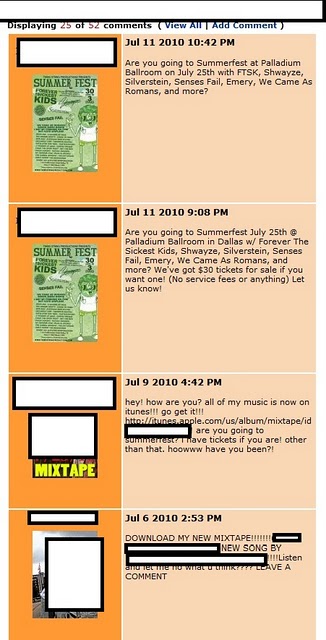Myspace, as a medium for social networking, is useless. The signal to noise ratio has plummeted so low that there is essentially no point in trying to reach fans through MySpace. It’s all comment spam, automatic “friending” programs, and bots. Most myspace comment boards look like this:

Do your fans really want to be spoken to in this way? What does it say about you as an artist if you use the same tactics that mass junk mail operations to reach them? Does ANYONE ever have meaningful conversations through this medium that lead to a minor fan to becoming a superfan?
Let’s think about this. You are a musician, and you have limited time. Presumably, you are much better at music than most other things and should be spending most of your time on it if that’s how you intend to create a career. As such, you should always be conscious of the return on your investments (ROI), whether you’re spending time, money, trust, or fan attention (yes, it IS a currency). If you put in x amount of time putting up myspace comments, how do you expect this time spent to pay you back? If you’re sending out spammed messages, you’re spending time, attention, and trust.
Would it take 10 of these comment posting to lead to someone buying a song? Probably not. How about 100? A 1000? Ask yourself, when was the last time you saw a comment posted on a MySpace page and thought “Hmm, I should give these guys ten bucks” ?
Think on it.
Yeah, that’s what I thought.
When you are choosing how you’re going to market your music and talk to your fans, bevery conscious of your ROI. You’ve got limited resources. When you spend, make sure that you’ll be getting more back than you spent.
Unless, of course, you really want to get burned out and quit music forever. Then by all means spend frivolously!
—
Derek is an MBA who builds custom guitars and is the bassist for Onward We March, who will be releasing their first EP The Golden Vine in Q3 2010.